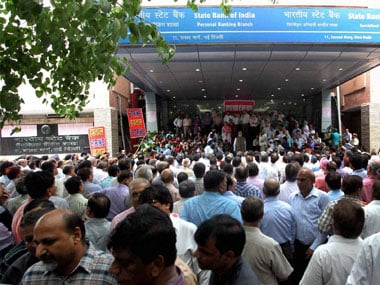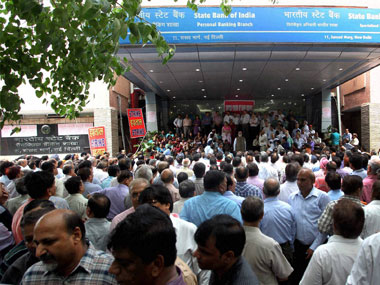Trade unions of bank employees, mainly those from state-run banks, will sit again with the Indian Banks’ Association (IBA), the industry lobby of banks, in February to continue with their negotiations on a wage rise. Unions, which had deferred a four-day strike in January after IBA improved their offer from 11 percent to 12.5 percent, has yet again threatened to strike work in February if their demands, which include a 19.5 percent rise in wages, aren’t met. At present, wages of staff in public banks are determined once in five years through bilateral negotiations with unions. Bank managements and trade unions have their own point of arguments. While IBA says the total burden on banks to effect a 12.5 percent wage revision (including other arrears) would be close to Rs 8,000 crore, unions cite the rising work burden of bank staff, and their relatively poor compensation and say they deserve better. In a larger context, for an aspiring government with ‘reforms’ as its primary focus, an immediate relook at the reform process of state-run banks and offering them autonomy to operate, is highly critical. And, when it comes to reforms in sarkari banks, scrapping the archaic methods and processes of wage determination of staff assumes significance. [caption id=“attachment_2069831” align=“alignleft” width=“380”]  Representational image of bank employees on strike. PTI image[/caption] It is difficult to have a permanent solution on the wage issue and the frequent strike calls unless the government steps in to kick-start the reform process in the wage structure and compensation policies of state-run bank employees. Government banks still control over 70 percent of the banking industry and no economy can become a major power without strengthening its backbone — an efficient banking system. In India, operational parameters of state-run banks have lagged way behind private and foreign banks. The lower wages of staff have arguably contributed this inefficiency. For one, it has dented the confidence of state-run bankers in a competitive market. On an average, employees in private and foreign banks earn four-five times more than their peers in government banks. Competing with your ‘rival’, who earns a fortune compared with your salary package, kills the motivation of the sarkari banker. Second, it causes the erosion of talent from state-run banks to private and foreign rivals. This is more evident among the young officers handling specialist operations. There has been an exodus at the junior level mainly on account of the much attractive packages offered by private banks. Earlier, a government bank job offered security almost unequivocally and that outweighed the concerns of poor compensation. But it doesn’t work much now, especially since the compensation gap with private sector has widened in the recent years. Recently, an RBI panel, which looked at the performance of state-run banks had warned about an “erosion of specialist skills” due to “significant and widening compensation differences with private sector banks”. Noting this as constraining the ability of government-controlled lenders to compete for market share and profits, the panel said it could contribute to a sharp fall in the market share of state-run banks to 10 percent by 2025 from 73 percent in 2013. To understand the vast differences in the compensation structure, one just needs to take a look at the comparison of the compensation figures of chief executive officers in some of the private and public banks. The chief of State Bank of India (SBI) earned an annual compensation of Rs 23.01 lakh in 2012-13, while the head of ICICI Bank, SBI’s nearest competitor, took home Rs 5.2 crore in 2013-14. SBI chairman’s annual compensation figure for fiscal year 2014 isn’t available yet. Remember, total assets of SBI, as at end September, stood at Rs 18.74 lakh crore , whereas that of ICICI bank was at Rs 6.11 lakh crore. Similarly, the compensation for the chief of HDFC Bank in 2013-14 stood at Rs 6 crore, while that of the chairman of Bank of Baroda was just over Rs 25 lakh. Interestingly, even the chief of microlender, SKS Microfinance, took home Rs 1.6 crore in 2013-14 as his annual pay — nearly eight times the chairman of Bank of India earned. Chiefs of state-run banks also earn other perks — car, residence, driver and a servant, for which the bank will pay, but still the difference is huge. This being the case with an official who runs a large bank with assets running in trillions, it is needless to say about the lower cadre employees. For most of state-run bankers, a ‘high-paying’ job comes only after retirement when they take up a consulting role or similar kind in some private companies. The reason for such a big difference in the compensation structure of sarkari banks and their rivals in private sector is simple. Salaries in public sector banks are decided through mutual discussions between the Indian Banks’ Association, the industry body of banks, and the bank unions once every five years. Often, there is no agreement between trade unions and IBA on this, resulting in endless calls for strikes by bank employee unions that frequently disrupting the operations of banks. In contrast, salaries of top executives at private sector banks are decided by individual bank boards and shareholders with the approval of the Reserve Bank of India. Compensation packages to bank officials should not be offered on a uniform basis but should be offered in relation to the size of the bank and performance, which isn’t the case presently. And till this anomaly is rectified, the system will produce more tainted officers like SK Jain of Syndicate Bank, who was arrested on charges of bribery. Logically it doesn’t make any sense to offer identical packages to employees across banks with different business sizes - say a big bank like SBI and small bank like Dena Bank. Also, the performance indicators of individual employees should be taken into account. Perhaps, the time is right for the government to acknowledge this problem and work towards resolving it taking cues from the private sector, given the rapid changes witnessed in the banking industry with the arrival of new set of banks. Individual banks should be given the autonomy to offer deserving compensation to employees who perform well. Similarly, no free lunches should be offered to non-performers. (Kishor Kadam contributed to this story)
Individual banks should be given the autonomy to offer deserving compensation to those who employees who perform well
Advertisement
End of Article


)

)
)
)
)
)
)
)
)



